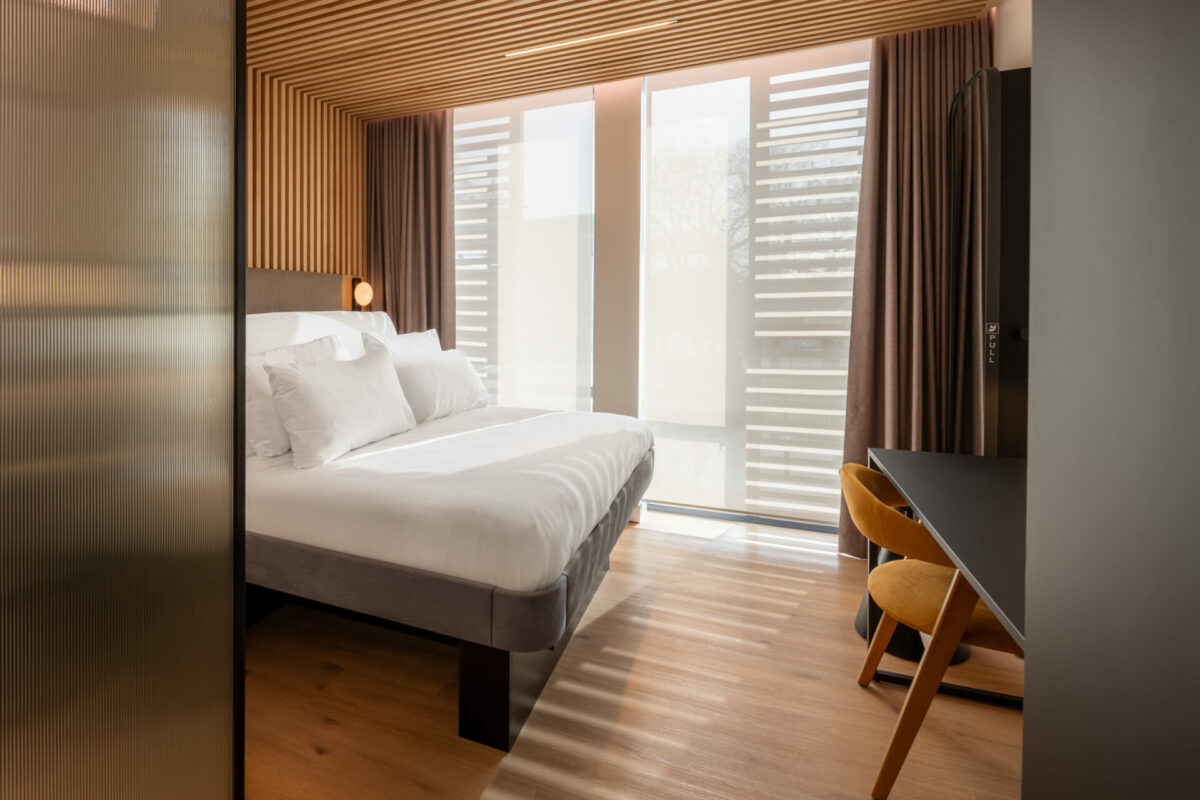Deputy Editor Megan Christopher was invited to take a first look at the brand new YotelPad London Stratford and discover the beauty that lies within…

YotelPad in London Stratford, a stone’s throw away from the iconic Olympic Park, isn’t your average hotel. It’s a bold experiment in micro-living, a concept that trades square footage for intelligent design and a focus on guest experience. Stepping through the doors, however, it’s immediately clear that this isn’t a story about sacrificing style for practicality. YotelPad embraces compact living with an enthusiasm that translates into a visually dynamic and comfortable interior experience.
The lobby sets the tone for the entire hotel. Gone are the cavernous spaces and traditional check-in experiences. Instead, YotelPad greets guests with a sleek, modern pod where check-in is a swift, automated affair. Alternatively, if you prefer to face-to-face approach, a helpful member of staff is ready and waiting for you. Guests can help themselves to a public coffee station, which is well stocked with locally sourced produce, another touch that Yotel is known for.
The guest rooms themselves are where the magic of YotelPad’s design truly unfolds. The term ‘micro-living’ might conjure up images of cramped and spartan spaces, but YotelPad cleverly utilises every square inch to create a comfortable and stylish environment. They hey lies in their signature ‘smart beds’. These ingenious contraptions fold up against the wall when not in use, freeing up valuable floor space during the day and providing guests with a sofa-style seating area. When unfolded at night, they provide a comfortable sleeping area with plush bedding and cleverly integrated lighting.

Image credit: YotelPad Stratford
But the smart beds are just the tip of the iceberg. YotelPad’s are packed with space-saving features that don’t compromise on aesthetics. Well-placed desks provide a functional workspace when needed and disappear seamlessly when not in use. Integrated storage solutions utilise every nook and cranny, ensuring there’s a designated spot for luggage and belongings without cluttering the limited space.
The material palette is a further testament to the hotel’s commitment to thoughtful design. Light woods and natural tones create a sense of airiness, while pops of colour and artwork add a touch of personality. The use of mirrors also helps visually expand the space, making the rooms feel larger than their actual footprint.
YotelPad London Stratford doesn’t just excel in functionality; it understands the importance of creating a welcoming ambiance. The strategically placed mood lighting allows guests to adjust the atmosphere to suit their needs, whether it’s a bright and energising space for work or a warm and inviting environment for relaxation. High-quality finishes and thoughtful design details, like built-in USB charging ports and ergonomic workstations, further elevate the guest experience.

Image credit: YotelPad Stratford
Deputy Editor Megan Christopher had the opportunity to meet with Hubert Viriot, CEO of Yotel and ask a few questions…
MC: So, why Stratford?
HV: Stratford is the future. Stratford is what people want right now. It’s this destination where you have entertainment, with the West Ham stadium, but it’s a major event space. There is retail and shopping, residential and offices. It’s like a complete destination. That’s what I really like about Stratford, it’s like a mini version of the city of the future. When you look at those new cities and compare them with cities like Dubai, that’s what it is, right? When you combine all those things in one area, it’s because that’s what people want. It’s also a very accessible part of the country now with huge train lines and tube lines coming here, so it’s well connected.
MC: What are the key features of the YotelPad brand compared to a typical Yotel?
HV: A typical Yotel is 100 per cent transit demand. We’re targeting people on the move. With an average length of stay at two night, we’re giving them the perfect room and facilities for a short stay in some of the busiest centres around the world. Our objective with YotelPad is slowing down, so we are targeting longer stay at around four to eight nights. The trend we’re seeing all around the world is, on one hand, you have people travelling fast, which Yotel is tapping into, and YotelAir in an even more extreme manner. And then you also have another layer of travellers, which are slower because they are more nomadic travellers. YotelPad is compact, but it’s got everything you need. You’ve got the features of a Yotel room but you also have a kitchenette, more storage and more space, with a desk and dining table and places to rest. It gives you a bit more of a residential, homey feel, which is the whole purpose.
Another objective with YotelPad is where part of the project can be sold to investors, so it’s also targeting another type of customer. Someone who travels regularly, or has a partially nomadic lifestyle, but needs to have a home that they are not using full time. So when you’re travelling, your property is also working for you.
MC: Where can we expect to see the next YotelPad?
HV: On a stand alone basis, there will be fewer. As this stage we are looking at YotelPad as a mixed use basis with Yotel. We have projects in the US that are mixed us, and that’s what we’re looking at. We want to gauge the reaction of YotelPad Stratford from both a consumer and investor point of view.
YotelPad is a triumph of intelligent design. It proves that even in micro-living spaces, comfort, style and functionality can co-exist. The hotel’s commitment to innovation and its focus on guest experience are evident in event detail, from the lobby to the cleverly designed rooms. YotelPad isn’t just a place to stay; it’s a testament to the transformative power of thoughtful design.
Main image credit: YotelPad London Stratford
